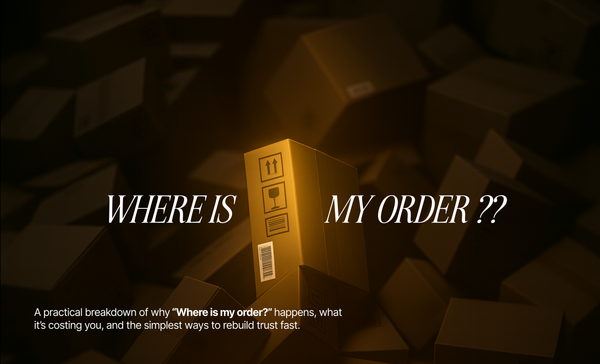The Ultimate Guide to Delegating Tasks Effectively for DTC Businesses
DTC brand owner overwhelmed? Delegate tasks & empower your team! This guide unlocks growth & shows you how to delegate effectively. #DTC #ecommerce #delegation

As a DTC (direct-to-consumer) brand owner, you wear many hats. From product development and marketing to customer service and fulfillment, the initial stages of building your brand require your involvement in almost every aspect. But as your business grows, clinging to every task becomes a recipe for burnout and hinders your ability to scale. This is where effective delegation comes in.
Key Takeaways
- Why Delegate Tasks?
- Challenges of Delegation in a DTC Business
- 15 Tasks You Can Delegate in Your DTC Business
- The Ultimate 6-Point Guide to Delegate Tasks Effectively
- How to Measure the Performance of Delegated Tasks (Kim.cc in Action)
- Conclusion
Why Delegate Tasks?
Delegation isn't just about easing your workload; it's a strategic move that fuels DTC business growth. Here's why:
- Increased Focus: By delegating repetitive or specialized tasks, you free up your time to focus on high-level strategic decisions, product innovation, and long-term growth initiatives.
- Enhanced Expertise: Delegating to qualified individuals allows you to leverage their specific skills and knowledge, leading to better outcomes in those areas.
- Empowered Team: Entrusting responsibilities fosters ownership and a sense of accomplishment among your team members, boosting morale and engagement.
- Scalability: Effective delegation allows you to build a team capable of handling increased workload as your brand scales, ensuring smooth operations and continued growth.
Challenges of Delegation in a DTC Business
While the benefits are clear, delegation can be a challenge in the fast-paced, dynamic environment of a DTC brand. Here are some common hurdles:
- Finding the Right People: Identifying individuals with the necessary skills and experience to handle delegated tasks can be tough, especially in the early stages.
- Relinquishing Control: Letting go of tasks you've always done yourself can be difficult. Trusting others requires a conscious effort.
- Communication Gaps: Miscommunication regarding expectations and timelines can lead to frustration and wasted time.
15 Tasks You Can Delegate in Your DTC Business
Here's a breakdown of tasks across various DTC business functions that you can effectively delegate:
Marketing and Sales
- Social Media Management: Schedule posts, engage with followers, and monitor analytics.
- Email Marketing: Create and send email campaigns, manage email lists, and track results.
- Content Creation: Write blog posts, product descriptions, and other website content.
- Customer Acquisition: Conduct market research, identify target audiences, and run targeted ads.
- Customer Support (Level 1): Answer basic customer inquiries via email, chat, or phone.
Operations and Fulfillment
- Inventory Management: Track product stock levels, manage purchase orders, and coordinate with suppliers.
- Order Processing: Review and fulfill customer orders, including packaging and shipping.
- Warehouse Management: Organize and maintain warehouse space for efficient storage and retrieval.
Finance and Administration
- Accounting: Manage bookkeeping, pay bills, and generate financial reports.
- Data Entry: Input customer data, product information, and other essential data into relevant systems.
- Administrative Tasks: Schedule meetings, manage travel arrangements, and handle other administrative duties.
Product Development and Design
- Product Research: Conduct market analysis, identify customer needs, and research product trends.
- Graphic Design: Create product packaging, website visuals, and marketing materials.
- Photography: Capture product images for website and marketing purposes.
- Customer Service (Level 2): Handle complex customer inquiries and product returns.
The Ultimate 6-Point Guide to Delegate Tasks Effectively
1. Choose the Right Person: Match tasks to individuals' skills and experience. Utilize Kim.cc's project management and team collaboration features to clearly define roles and responsibilities.
2. Set Clear Expectations: Outline the task, desired outcomes, deadlines, and communication protocols. Use Kim.cc's goal-setting tools to establish clear, measurable objectives for each delegated task.
3. Provide the Necessary Resources: Equip your team members with the tools, training, and budget needed to complete the task successfully. Kim.cc's resource management features can help you track and allocate resources effectively.
4. Offer Ongoing Support: Don't disappear after delegating. Be available for questions, guidance, and troubleshooting. Kim.cc's communication tools enable seamless interaction between you and your team.
5. Encourage Initiative: Don't micromanage. Allow your team members to make decisions and propose solutions within established boundaries.
6. Provide Feedback and Recognition: Regularly monitor progress, offer constructive feedback, and celebrate successes. Use Kim.cc's performance tracking features to monitor progress and acknowledge accomplishments.

How to Measure the Performance of Delegated Tasks (Kim.cc in Action)
Effective delegation requires a data-driven approach to ensure tasks are completed efficiently and effectively. Here's how you can leverage Kim.cc's functionalities to measure performance for delegated tasks:
- Track Progress and Deadlines: Kim.cc provides a centralized platform for task management with due dates and progress tracking features. This allows you to monitor progress in real-time and identify any potential roadblocks that might hinder timely completion.
- Utilize Productivity and Quality Monitoring Tools: Integrate Kim.cc with project management tools that offer features like time tracking and activity monitoring. This data can reveal insights into individual and team productivity levels, helping you identify areas for improvement and optimize delegation strategies.
- Set Up Performance Metrics: Define key performance indicators (KPIs) specific to each delegated task. For example, for social media management, KPIs might include follower growth, engagement rate, or website traffic generated from social media campaigns. Kim.cc allows you to set goals and track progress against these KPIs, providing a clear picture of success.
- Conduct Regular Reviews and Feedback Sessions: Schedule regular check-ins with team members to discuss progress, address challenges, and provide constructive feedback. Kim.cc's communication tools facilitate these interactions, ensuring open communication and ongoing development.
By implementing these strategies and utilising the comprehensive features of Kim.cc, you can effectively delegate tasks within your DTC business. This empowers your team, frees up your time for strategic initiatives, and ultimately paves the way for sustainable growth.
People Also Ask
What are the 5 levels of delegation?
The five levels of delegation range from simple task assignment to complete ownership:
- Do it yourself: You complete the task yourself.
- Do it and tell me: You complete the task and then inform your team member.
- Sell it to me: You present the task and its goals, and the team member proposes a solution.
- Do it and ask me if okay: The team member completes the task and seeks your approval before finalising.
- You do it and keep me informed: The team member takes complete ownership and keeps you updated on progress.
How do I effectively delegate tasks?
Follow the 6-point guide outlined in this blog for effective delegation: Choose the right person, set clear expectations, provide resources, offer support, encourage initiative, and provide feedback and recognition.
Conclusion
Delegating tasks can feel daunting at first, but remember, it's not about handing off burdens, it's about building a strong and capable team. As your DTC business flourishes, embrace delegation as a chance to empower your team, refine your focus, and propel your brand towards even greater success. Take the first step today – identify a task you can delegate, choose the right person for the job, and watch your business thrive with the power of collaboration.



